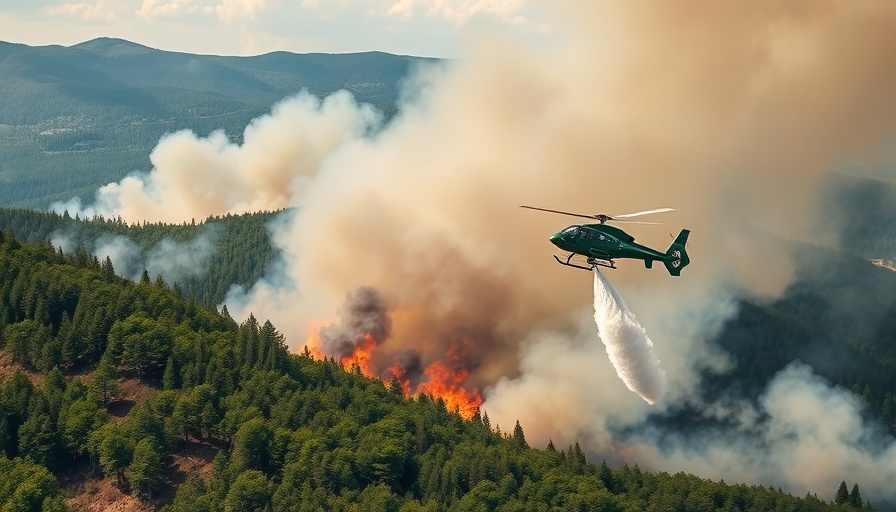
Devastating Records: UK Wildfires Surge to Unprecedented Levels
2025 has already set a disturbing precedent for wildfire activity in the United Kingdom, with over 113 square miles scorched by flames, surpassing annual records in just the early months of the year. This alarming statistic comes from the Global Wildfire Information System (GWIS), indicating the severity and urgency of the situation.
Understanding the Cause: Weather's Role in Fire Conditions
One of the key factors contributing to this wildfire crisis is the unusually dry weather experienced since early spring. Will Lang, head of the Met Office’s risk and resilience services, highlighted that March was marked by exceptionally dry and sunny conditions, establishing a perfect storm of flammable vegetation following a wetter winter that created ample fuel for fire outbreaks. When this dry spell coincides with dormant winter vegetation, the risk escalates rapidly.
The Growing Threat: Historical Context and Future Predictions
Statistics reveal a grim trajectory; as of now, 2025 has already surpassed the 2019 record, which stood at 108 square miles burned. With about 80 wildfires recorded this year alone, it raises the question of what the summer months will bring. As fire science professor Guillermo Rein pointed out, smaller, manageable wildfires in spring can lead to larger, catastrophic events in summer. This pattern illustrates a worrying shift in wildfire dynamics due to climate change, prompting experts to warn of even greater wildfire risks in the coming decades.
The Ecological Impact: More Than Just Destruction
While wildfires are often perceived as wholly destructive, the reality is more nuanced. Certain ecosystems, especially heather-rich environments in the UK, have adapted to mild fire disturbances. Smaller, low-intensity fires can promote biodiversity and stimulate new growth by clearing out the underbrush. However, the challenge arises when wildfires become too frequent or severe, hindering these natural recovery processes. As Prof. Rein noted, the escalating intensity of summer wildfires threatens to obliterate these vital ecosystems.
Community Preparedness: A Call for Action
The spring wildfires also serve as a reminder of the responsibility communities bear in fostering resilience against fire risks. The Met Office has voiced the need for increased awareness around fire-prone areas, especially in heather heaths and grasslands. Simple prevention measures, such as clearing debris and ensuring proper land management practices, can drastically reduce ignition sources. Communities encouraged to remain alert and engaged in such preparedness activities will be better equipped to handle these escalating risks.
Finding Balance: The Dual Nature of Wildfires
As discussions about wildfires become more prominent in light of the current crisis, it’s crucial to address both the beneficial and detrimental aspects of these forces of nature. On one hand, they can rejuvenate landscapes and support certain species; on the other, they can threaten lives and property, and wreak havoc on ecosystems. Education surrounding wildfire management, coupled with community engagement, may pave the way for a more balanced approach to embracing and mitigating these natural phenomena.
A Personal Perspective: How Can You Contribute?
As a reader concerned about the effects of climate change and wildfires, you might feel overwhelmed by the weight of these issues. Yet, taking personal responsibility can bring a sense of empowerment. Here are a few steps you can take:
- Stay Informed: Understanding local fire seasons and conditions can help you better prepare.
- Participate in Local Initiatives: Join community efforts focused on fire prevention and land management.
- Advocate for Change: Support policies emphasizing ecological health and sustainable development.
By taking these steps, you contribute not just to local health and safety but also to the broader narrative of sustainability and resilience.
As we face a future where wildfires are increasingly common, information and community engagement are paramount. Stay connected to local environmental initiatives and empower yourself to be part of the solution.
 Add Row
Add Row  Add
Add 




 Add Row
Add Row  Add
Add 

Write A Comment